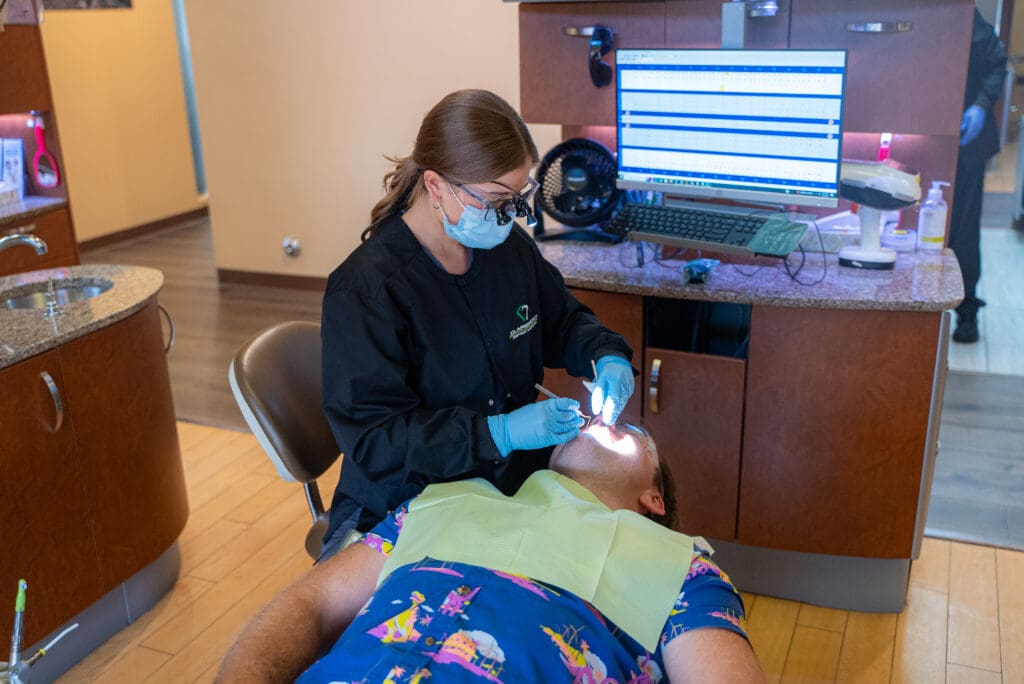Periodontal disease is a prevalent oral health epidemic. A bacterial infection of the gums causes this harmful disease. You can often avoid periodontal disease with improved oral hygiene practices and routine visits to our dental office. Left untreated, periodontal disease can progress and result in additional dental health concerns.
Gingivitis or periodontal disease can become quite a problem for your teeth, and health. Claremont Dental Institute is home to expert periodontists that help patients tackle the disease. We will help you get rid of bleeding gums, halitosis (bad breath), loose teeth and gum recession.
As dental experts, Claremont Dental Institute offers comprehensive gum disease treatment in Claremont, CA. Our dental team specializes in preventing gum disease from developing and treating it at all different stages.
What is Periodontal Disease?
Periodontal disease, also known as gum disease, is a chronic inflammatory condition that affects the tissues surrounding and supporting the teeth. It is mainly caused by plaque buildup that is filled with bacteria on the teeth and gums.
Failing to remove plaque that forms on your teeth every day can lead to a bacterial infection. The bacterial infection will multiply and spread, forming deep periodontal pockets in the gum line as well. This will cause your gums to swell and eventually begin to recede.
If you fail to treat it, gum disease can cause serious harm to the supporting bone structure, tooth loss, and systemic health issues. Gum disease increases the risk of the following:
- Cardiovascular disease
- Heart Attack & Strokes
- Loss of Jaw Bone
- Facial sagging
- Missing teeth
- Tooth loss
- Halitosis
What increases my risk of developing gum disease?
Several factors can increase your risk of developing gum disease. Poor daily oral hygiene, such as not brushing and flossing, causes plaque to form and build up on the teeth. Plaque leads to gum inflammation and infection. Smoking or using tobacco products significantly increases your risk because these habits impair gum tissue’s ability to heal.
Genetic predisposition can also play a role. Some people are more susceptible due to hereditary factors. Also, conditions like diabetes and certain medications can compromise gum health by reducing saliva flow or changing the stability of bacteria in the mouth.
Additionally, poor-fitting dental restorations, missing teeth, broken or ill-fitting dental fillings, and crooked teeth can all increase your risk of developing gum disease. Regular dental appointments, daily oral hygiene practices, and caring for your dental restorations can help avoid periodontal therapy.

About Periodontal Therapy in Claremont, CA
Common symptoms of periodontal disease include swollen, red, or bleeding gums, persistent bad breath, and loose teeth. Effective management typically involves professional dental cleanings, improved oral hygiene practices, and sometimes surgical interventions. Early detection and treatment are crucial to preventing the progression of this debilitating condition.
Patients with gum disease are more likely to experience a decline in their oral wellness and their systemic health. Late-stage gum disease can cause an increased risk of serious medical conditions and poor health. For this reason, it is imperative to not ignore the signs of this oral disease.
We tailor the periodontal therapy treatments that we provide for gum disease to the unique needs of each of our patients. Our dentist will first thoroughly examine your teeth, gums, and jaw bone. He will determine the extent of treatment necessary to restore your oral health. For some patients, a combination of periodontal therapy and restorative treatments will provide the best results.
For patients with advanced stages of gum disease, known as periodontitis, you may see our in-house periodontist. Our periodontist has specialized training in the prevention, diagnosis, and treatment of gum disease.
For the optimal comfort of our patients, we also offer dental sedation options. Our dentist will discuss your options for sedation during your initial visit. We will base our recommendations on the procedures you need, your medical history, and your overall health. To learn about our dental sedation options, see Sedation Dentistry.
Gum Disease Treatment in Claremont, CA to Restore Your Oral Health
Claremont Dental Institute provides a full range of periodontal therapies for all stages of gum disease. We perform all procedures in-house and manage all phases of the treatment plan.
We provide precise, effective, and less invasive options for restoring health to your gums and smile. Our state-of-the-art dental technology and laser therapy helps you get fast relief. Let us help get your mouth healthy again with periodontal therapy in Claremont, CA. The following are the treatments that we offer.
Dental Cleanings
Routine dental cleanings can help prevent the spread of oral bacteria. Six-month teeth cleanings are ideal for controlling gum disease and preventing further damage to your gums, teeth, and jaw. Routine dental cleanings are also great for our patients with diabetes, oral cancer, and other conditions that affect the mouth. Maintaining a healthy oral environment is essential for good health overall.
Scaling and Root Planing
For patients with hard plaque build-up, a scaling and root planing treatment can help. This deep cleaning method removes plaque and helps prevent the spread of disease-causing bacteria and removes tough plaque build-up. This procedure also removes tartar and calculus from the teeth and gums, preventing further gum disease. It can also help reduce inflammation, bleeding and discomfort in your mouth.
After the procedure, the clean gums are able to heal and naturally reattach to your teeth. Patients who have undergone this procedure have seen significant improvements in their overall oral health.
Bone surgery
Bone loss is common in patients with advanced gum disease, or periodontitis. Tooth loss or periodontal pockets because of bone regression are the main causes of jaw bone loss. Bone grafting surgery can rebuild jaw bone tissue and seal-off pockets in the jaw where bacteria can grow.
This surgery can also help replace missing teeth, repair fractures, restore normal facial structure, and even prevent oral cancer. Bone surgery is an essential tool for restoring the health of your mouth and ensuring long-term success with dental health.
Soft tissue grafts
Gum recession is a serious condition that can lead to tooth loss and an increased risk of advanced periodontal disease. Soft tissue grafting is a procedure that can help rebuild the gums and restore them to their original shape.
We may recommend this procedure for patients with advanced gum inflammation and periodontitis who have experienced gum recession. It is a safe and effective treatment. The procedure can help restore the health of your mouth, prevent further damage, and improve your oral health.
Pocket reduction
Pocket reduction is an effective oral surgery procedure for gum issues. It can help reduce the size of large periodontal pockets because of the spread of bacteria in your gum tissue. It involves removing tartar and plaque buildup from around the tooth. Then reshaping and smoothing out any rough edges of the pocket to prevent further bacterial growth.
After a thorough oral exam and periodontal charting, our periodontist or dental hygienist will decide how much to reduce.
Guided tissue restoration
Guided tissue restoration is a periodontal therapy that helps to stimulate the natural regrowth of gum and bone tissue. Our periodontist will create a barrier between the healthy gum tissue and the infected area. This will allow new healthy tissue to grow in its place.
This process can help reduce inflammation, improve oral hygiene, and restore lost gum and bone structure. We can also treat other conditions such as tooth loss or recession of the gums using guided tissue regeneration.
Gum Disease Treatment FAQs
Periodontal disease is a serious condition that requires professional treatment. If you are newly diagnosed, read through our frequently asked questions section to learn more about the disease and how we treat it. Call our office if you have additional questions or concerns.
Is periodontal therapy painful?
No. Periodontal therapy during the early stages of periodontal disease should not hurt. Your treatment can be as quick and painless as getting a dental filling with local anesthetic, modern dentistry, and an experienced dentist.
What if I ignore the signs of periodontal disease?
Without treatment, you are leaving yourself open to further tooth and gum damage, and tooth loss. Periodontal disease does not go away without treatment. It can lead to more overall health concerns as well.
Gum disease can contribute to strokes, heart disease, and diabetes. It’s better to address it as soon as possible, while it’s still easily treatable.
How long will periodontal therapy results last?
Your gum disease should be completely gone after periodontal therapy and follow-up visits. With excellent oral hygiene and following recommended instructions from the dentist, you may never get gum disease again.
How can I avoid gum disease?
It is important to visit the dentist at least twice a year for a routine oral health exam. These regularly scheduled dental exams give our dentists the opportunity to catch any developing dental health concerns early on. We provide proactive treatment options to tackle gingivitis to prevent serious damage. Also, you must thoroughly brush and floss your teeth every day to maintain proper oral health.
What is the difference between gingivitis and periodontitis?
Both are forms of gum disease, each representing a different stage in the disease. Gingivitis is the initial stage and is typically mild. Signs of gingivitis include inflammation of the gums or bleeding gums. Gingivitis is caused by plaque build-up on the teeth from lack of proper oral hygiene. Left untreated, gingivitis will develop into periodontitis.
Periodontitis is the more advanced stage, characterized by gum inflammation and destruction of the gum tissue and bone that support the teeth. Tooth loss is likely if it is not addressed. The key difference between these conditions lies in their severity and the extent of damage to the oral structures.
Our Claremont, CA periodontist near you offers advanced treatment options. He will address the soft tissue damage, affected teeth, and your jaw. We will evaluate your oral health and build a personalized treatment plan to address your gum disease issues. Schedule an appointment to learn more about periodontal treatments near you.
